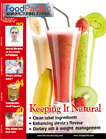Food Pacific Manufacturing Journal
Despite the lack of a clear-cut and legally binding definition for 'natural' as used in food and beverage labelling, it's clears that more and more consumers are identifying the term with cleaner, safer and healthier options. Amidst the recent economic upheaval, more are cooking at home and cooking from scratch. When they do step out to eat or shop for branded foods, they're more conscious of their choices. Increasingly educated and activist, consumers have become more pro-active. They're reading labels and checking them for no-no ingredients such as additives that sound like they belong to a laboratory, and artificial colourants and flavours. They're frequenting shops, supermarkets and local markets with a wider range of natural and organic alternatives. They're even insisting that 'natural ingredients' mean not only natural in origin, but also natural in the way they are extracted and modified. Manufacturers are responding to foods and beverages that are 'clean label' - free of artificial aromas, synthetic colour and flavours and other additives - not only because of the growing market, but because such products can be positioned as premium items. It's clear that 'back to nature' is the future. Mintel reported recently that the number of new products making natural claims increased steadily in all regions between 2005 and 2009, whilst consumer interest in 'minus' claims shoppers' enthusiasm for low-fat, low-sugar or low-calorie claims) or added functional ingredients claims ('plus' claims) has waned; their interest in natural claims has continued to grow. "Today's consumers are becoming more health conscious, and as a result, are turning to natural food ingredients, rather that chemical-based ingredients," comments Simone Bouman, market unit manager Food Division, Purac Asia Pacific. This explains why Stevia, despite its aftertaste, has become the darling of low- to non-caloric foods and beverage industry. Natural flavour-masking ingredients can always mask this aftertaste and balance the overall flavour of the beverage, she adds.

